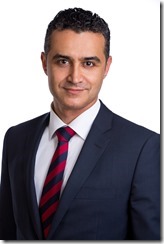Vodafone Qatar today announced new appointments to the company’s management team.
Mahmud Awad has been appointed as chief business officer and Ramy Reyad as chief technology officer. 

Mahmud Awad (right) has been appointed Vodafone Qatar’s chief business officer
Ramy Reyad (left) is Vodafone Qatar’s incoming chief technology officer
With 18 years of telecom experience, Awad joins Vodafone Qatar from UAE telco Du where he was the VP of corporate sales leading a sales team of 100 professionals. During his time at Du, Awad created new revenue streams, introduced more industry specific solutions and established an end-to-end solution sales approach. Awad has also held executive roles with Neoris, Al Wataniya Telecom and Nokia Solutions & Networks.
Reyad has over 15 years of experience in telecom and joins Vodafone Qatar from Mobilink. As Mobilink’s CTO he successfully transformed the Mobilink technical department to optimise cost and investment. He also directed critical technical projects and oversaw the rollout of new capacity projects. Reyad will lead Vodafone into its next phase including LTE 4G launch and ensuring Vodafone’s infrastructure supports Qatar’s knowledge based economy.



